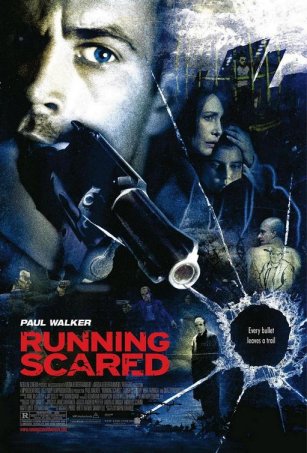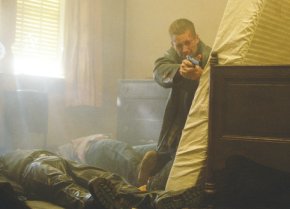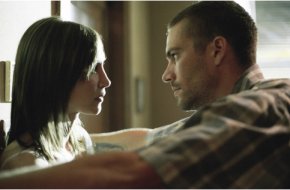|
Running
Scared
Desperation
suits Paul
Walker.
For at least two-thirds of Running Scared,
Walker gives the most natural, highly energetic performance
of his career. Pushed by a script and hyperkinetic direction
by Wayne Kramer, neither Walker nor the audience has much
of a chance to breathe, as Walker's Joey Gazelle bounds
about like his namesake just to stay alive.
But we have no regrets. Running Scared
grabs us by the hair and pulls us along through the Black
Forest of mob mythology. There's not even time to leave
a trail of breadcrumbs.
Kramer actually gives us two parallel narratives,
though he tips us off to them by showing snippets of their
combined culmination first. Joey Gazelle walks in a frightening
adult world, but as a low-level mob guy, it's of his own
making. Next door, however, lives a stoic little boy who
steals one of Joey's guns, setting him off on an adventure
through an underworld that has as much to do with fairy
tales as it does just general low-lifes.
Heavily influenced by the non-Disney versions
of folktales, Running Scared does not actually have
supernatural elements. But Kramer remembers that to children,
adults can be monstrous enough.
Thus to young Oleg (Cameron Bright) a crackhead
can appear to be a raspy troll, and pedophiles reveal their
real selves in shadows cast through beveled glass, gaunt,
hungry and grasping for young flesh. Perhaps the youth sees
more truth than anyone else in the film.
Certainly, Kramer plays with illusions.
Oleg's stepfather Anzor (Karel Roden) cooks meth and lazes
about lamenting John Wayne's fate in The Cowboys.
He has taken his obsession with the Duke so far as to have
him tattooed on his back. Why not? John Wayne is a twentieth
century folktale himself - an image portraying a myth.
That even seeps down to Pimp Lester (David
Warshofsky), who constantly reassures himself that he is
the mack daddy. When all else fails, he quotes Scarface,
clichéd perhaps, but definitely believable - we've come
to define ourselves by the stories our culture tells about
us.
Though the film has depth, it is first
and foremost a relentless action film. Since Kramer acknowledges
his cultural debts in the story, what has to set his work
apart is the style. Flashier in parts than Quentin Tarantino,
the director at least manages to keep the meaning of his
story in sight for the most part. He plays with time, showing
us sequences in reverse to replay them from another angle.
In a couple of places, he shows possible steps ahead.
For the majority of the time, Kramer keeps
the film in muted tones, all the better to make his places
of true evil stand out. While hockey arenas might survive
the knock they get here, the cold affluence of upper-class
suburbia appears quite chilling, even in cheery hues.
Unfortunately, the trickery gets distracting
and ultimately proves unnecessary as the film's most powerful
sequences do without it. Kramer also makes a rather pat
moral choice for the plot that almost derails the movie.
It built up quite a head of steam charging in all the way
from left field, though Kramer manages to distract it with
a little bit of the old ultraviolence.
The plot device definitely derails Walker,
though. It's almost as if he portrays two separate characters,
and one of them we've seen him do time and time again. Pinocchio
plays in reverse here; long after the Blue Fairy visits,
Walker reverts back to the little wooden boy.
But what a time he gives us first. Bursting
with raw energy that permeates both light and dark moods,
he really commands the screen. Again, that could be Kramer's
relentless pace, because child actor Bright seems more lively
than usual, too, and his character is actually described
as one who never smiles.
Tying the two together, Vera Farmiga plays
Walker's loving wife Teresa with all due steel and warmth,
doling them out exactly as necessary. She has the best scene,
really, and makes a memorable turn here, especially playing
opposite Elizabeth Mitchell as a grown up Gretel gone horribly
wrong.
In Kramer's world, there are monsters,
and going into the dark woods can change a man. Sitting
in the dark theater might not change you, but Running
Scared will still deliver thrills.
Rating:

|








